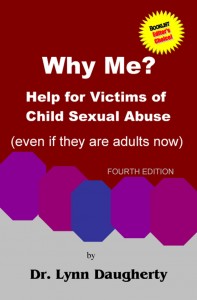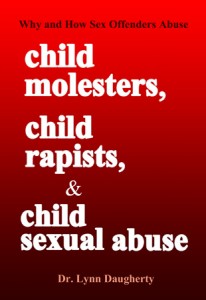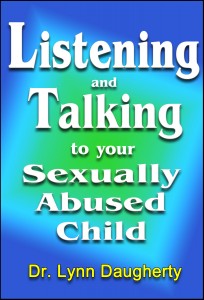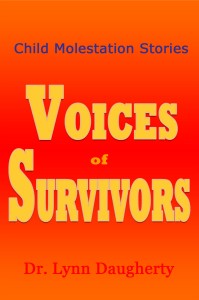Child Sexual Abuse: Memories and Feelings: Recovery and Healing
A selection from Dr. Lynn Daugherty’s classic bestseller, Why Me? Help for Victims of Child Sexual Abuse (Even if they are adults now), 4th Edition
(Child sexual abuse trigger warning and disclaimer)

Paperback $12.95 (US).
Available from these booksellers.
You are not responsible for the sexual abuse, whether molestation, rape or incest, that happened to you when you were a child. You are responsible for how you think, feel and act. You and only you, can decide how you will live the rest of your life. You and only you, can make the changes you desire. Other people can help you achieve the things you want, but you must do the work. Remember, you have some important strengths! You have gotten yourself through some really tough times in the past. You also have the strength and ability to make the changes you want now!

Paperback $9.95 (US).
Available from these booksellers.
How can a victim of child sexual abuse (molestation, rape or incest) change the way he or she thinks, feels and acts?
There are many things you can do to make changes as you move toward recovery. You can do many of these healing things on your own, but very often it is helpful to seek treatment from a professional counselor to help you work on making the changes you want. A professional counselor can often help you reach recovery sooner.

Paperback $7.95 (US).
Available from these booksellers.
All of the problems resulting from child sexual abuse can be corrected even if they have gone on for many years. Of course, the bigger the problems are and the longer they have lasted, the more work it will take for you to make changes. If the problems are very big and have lasted for a long time, you will probably need a professional counselor to help you make these changes through treatment.

Paperback $7.95.
Available from these booksellers.
If you are not able to make things better for yourself on your own, even after you have tried some of the suggestions in this chapter, consider getting help from a professional counselor. If you think of suicide frequently, the best thing you can do for yourself is to seek professional help immediately.
Even if your situation is not this extreme, it is comforting and helpful to have an understanding person to talk to about your problems. An understanding person can help you work them out in your own mind as you work toward recovery and healing. People who do not have special training often have trouble understanding your experiences and feelings. Professional counselors can understand them. Counselors can also offer suggestions and teach you skills to help you make the changes you desire.
Getting started
Okay, you have decided that you want to change some of the ways you think, feel and act. You are reading this book to help you do this. Now, how do you begin? The best way is to attack each problem individually, one at a time. Remember the different effects of child sexual abuse that we discussed. Let’s start with those.
Confusion
Confusion is a big problem for many victims of child molestation, rape or incest. They are often confused about what happened to them and why. They are also confused about their own reactions and emotions.
Learning more about child sexual abuse
One way to reduce your confusion about the things that happened to you is to learn as much as you can about sexual abuse. Reading books like this will help you understand more about your experiences. There are many other books available that can give you information about child sexual abuse. Look in the Bibliography at the end of this book for the names of some of these. Your public library can probably help you find them.
You can talk with other victims of child sexual abuse to help reduce your confusion. You can read novels or see television show about victims of sexual abuse to learn more about the problem and its solutions. Can you think of other ways you can get more information about child sexual abuse?
Sometimes questions still remain in your mind even after learning much about sexual abuse. Then it is a good idea to ask an expert to help you find the answers. A professional counselor is most likely to be able to answer the questions you have about child sexual abuse. You can reduce much of your confusion about your own experience by learning as much as possible about child sexual abuse.
Knowing what happened
Another source of confusions for victims of child sexual abuse is not being sure exactly what happened to them when they were abused. Sometimes it is difficult for a young child to understand just what is happening when the abuse takes place. Later this makes it hard to remember exactly what did happen. Sometimes victims who do understand what is happening try to block out memories of the sexual abuse. Other times this happens without much effort.
It is important for you to have a clear picture in your mind of exactly what happened to you. This will help reduce some of the confusion you feel about your experiences.
Go over the events that took place in your own mind. How did the abuse start? How long did it continue? What kinds of sexual acts did the abuse involve? Who abused you? How did the abuse end? What happened then?
It may be very unpleasant for you to think about these things, but knowing exactly what happened is important. When you are sure of what happened, you don’t feel so confused. If you have difficulty remembering just what happened, going over the events in your mind or talking about them with someone else may help you remember.
Remembering forgotten events can be a frightening, even terrifying, experience. You may want to seek help from a professional counselor during this process, especially if remembering causes you substantial emotional pain. A professional counselor can probably suggest other ways to help you remember forgotten or confused events, and can provide much needed support at this difficult time.
Identifying your feelings
Confusion about feelings is another problem for victims of child sexual abuse. You can learn to understand the feelings that many victims experience by reading about the effects of child sexual abuse on this website, in Dr. Daugherty’s book Why Me? Help for Victims of Child Sexual Abuse, and in books about sexual abuse.
It is important to identify and sort out your own feelings about many things. This will take some effort. It may cause you some pain, but it will help you feel better in the long run.
Most of the time, people do not have all pleasant or unpleasant feelings about someone or something. We usually have some pleasant feelings and some unpleasant feelings about something that has happened to us or about a certain person. You can reduce your feelings of confusion if you sort out these pleasant and unpleasant feelings. So let’s get started.
Unpleasant feelings toward the abuser
What unpleasant feelings do you have towards the person who abused you? Victims often feel anger and fear toward their abuser. Do you have any of these feelings? What exactly are you angry about? What exactly do you fear? What other unpleasant feelings do you have toward the person who abused you? It would be helpful if you would make a list of these feelings.
It is normal to have these unpleasant feelings. There is nothing wrong with you for having them. It is natural to have unpleasant feelings toward someone who has harmed you. But if you keep strong unpleasant feelings with you for a long time, you only harm yourself more. We will talk later about getting rid of some of these unpleasant feelings.
Pleasant feelings toward the abuser
In addition to the unpleasant feelings, many victims of child sexual abuse also have pleasant feelings towards the person who abused them. This is especially true if the abuser was a friend or a relative. This is not unusual.
It is perfectly normal to have pleasant feelings toward your abuser, in addition to the unpleasant ones. No person does only bad things even if he or she does some bad things. The abuser has probably done many good things as well as the bad things. So it is natural to have some pleasant feelings toward him or her.
Try to identify whatever pleasant feelings you have towards the person who abused you. What pleasant memories do you have of that person? What nice things did he or she do for you in addition to the harmful things?
Because of the sexual abuse you suffered, you probably have many feelings toward other people beside the abuser. Let’s look at your feelings toward these other people now.
Feelings toward other people
First of all, let’s look at your parents. Try to identify your pleasant and unpleasant feelings toward your parents because of the sexual abuse. Many victims blame their parents for not preventing the sexual abuse or are angry at them because they did not stop the abuse from taking place. Do you feel this way? What other unpleasant feelings do you have toward each parent? Why? What pleasant feelings do you have toward each parent? Why?
Next, think about the pleasant and unpleasant feelings you have toward other family members. What unpleasant feelings do you have toward each one of them? Why do you have these feelings? What did each person do that you dislike? What pleasant feelings do you have toward each family member? What did each person in your family do to help you with the problems caused by the abuse? What other feelings do you have toward family members?
What other people outside your family were involved in the sexual abuse or its aftermath? What unpleasant feelings do you have toward specific friends and acquaintances? What unpleasant feelings do you have toward teachers, counselors, medical personnel, legal personnel o others that you came in contact with because of the sexual abuse? What did they do that you dislike? What pleasant feelings do you have toward each of these people? What did each person do that was helpful?
Feelings toward yourself
Finally, try to examine your pleasant and unpleasant feelings toward yourself. Let’s look at the unpleasant feelings first. Did you, or do you now, blame yourself for the abuse? Are you angry at yourself in any way? Do you fear your own feelings or behaviors? Try to identify each unpleasant feeling that you have toward yourself as a result of the sexual abuse. Which one seemed strongest at first? Did any of the feelings change with time? Perhaps some increased and some decreased. Right now, which of these unpleasant feelings seems strongest in you? In what ways do you feel worse about yourself because of the sexual abuse?
Now, let’s examine the positive feelings you have about yourself because of the sexual abuse. They may be difficult to find, but you probably can discover some if you try hard enough. What things can you feel good about? Look for reasons to pat yourself on the back.
If you found a way to stop the sexual abuse, you can be proud of your ability to do this. If you told someone about the sexual abuse, you can be proud of your courage. If you were able to live through the sexual abuse, you can look at yourself as a strong person in many ways. What skills did you use to get through the experience of sexual abuse and the problems it caused?
If you are reading this book, you can feel good that you are doing something for yourself to make changes in your life. What else are you doing for yourself to make your life better? What strengths and skills are you using to do this?
So now you have started to examine your feelings. Good work! It has been hard figuring out just what feelings you have toward the people involved in your sexual abuse. You have done it—or at least you have made a start. Sometimes it takes a while to figure everything out. The more you think about it however, the clearer your feelings become and the less confused you are.
Understanding your feelings
You have probably reduced some of your confusion by sorting out some of your feelings. You may have also realized that they are not as frightening or as overwhelming as you thought they were. The unknown is more frightening than the known. Now you know more about your feelings. You know what they are. You know which ones you want to keep. You know which ones you want o work on changing. You know more about you!
You probably discovered you have many “mixed” feelings about people and events. Being able to recognize and live with conflicting feelings is a sign of maturity. It shows that you can accept the fact that everything in this world is not simple, not black and white. Every person is not good or bad. Each of us does some good things and some bad things. Accepting the fact that the world is not simple is part of becoming a mature adult.
You have a right to your feelings, whatever they are. Feelings are neither right nor wrong. They are the way you feel. Some feelings are helpful to you and some feelings may cause you difficulties. But do not let anyone tell you that you “should” or “should not” feel a certain way. You may want to change some of your feelings, but that is your decision.
Sharing your feelings
Maybe you want to share some of the feelings you have identified in yourself. You may want other people to know and understand how you feel. Perhaps you want the abuser to know, or maybe you want your family members to know. Perhaps you want your counselor or your friends to know.
Some people will welcome knowing what your feelings are even if they are unpleasant. Other people may have difficulty accepting your feelings.
Sharing feelings with other people involves risks. Maybe others won’t understand. Maybe they won’t care. Maybe they will make fun of your feelings or try to use them against you. Or, maybe they will be honored that you trusted them by sharing your feelings. Maybe they will be glad to know you better.
Only you can decide which feelings you want to share and with whom you want to share them. Your counselor can help you make these decisions. Your counselor can also help you plan how to share your feelings with someone effectively—if you decide to do this.
Summary: Reducing your confusion
Now we have talked about two ways to reduce your confusion, first, by learning more about child sexual abuse and what happened to you, and second, by identifying and understanding your own feelings. You have probably already come a long way toward reducing your confusion if you have followed the suggestions presented so far.
In Why Me? Help for Victims of Child Sexual Abuse (Even if they are adults now) Dr. Daugherty discusses ways to change your other negative emotions. She addresses the following topics:
Anger:
Using anger constructively
Expressing your anger
Fear:
Recognizing fear
Reducing anxieties
Shame:
You are not alone
Understanding others
Guilt:
It is not your fault
Feeling guilty doesn’t make it true
Depression and suicide:
Seeking help
Seeking alternatives
Self-esteem:
You are important
Recognizing your good traits
Helping others
Setting goals
Trusting
Social skills
Relationships:
Attitudes toward sex
Independence and maturity
Parenting skills
Physical abuse of your own children
Sexual abuse of children
To learn more about these and other topics, read . . .

Paperback $12.95 (US).
Available from these booksellers.
Read real stories of victims of child molestation, rape, or incest.

Paperback US $7.95
At Amazon.com and most booksellers

Paperback US $12.95
At Amazon.com and most booksellers

Paperback US $9.95
At Amazon.com and most booksellers
How does child sexual abuse happen? How and why do child molesters and rapists abuse children?
How do molestation, rape, or incest affect a child? Find other Questions and Answers about child sexual abuse as well as help and healing for victims.
Has your child been abused? Learn how to help your sexually abused child by listening and talking.

Paperback US $7.95
At Amazon.com and most booksellers
© Cleanan Press, Inc. 2004 – 2020
